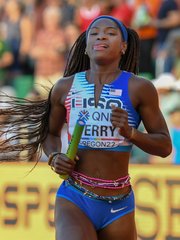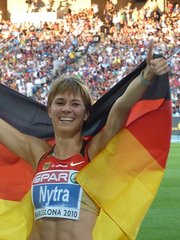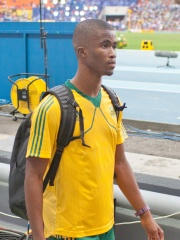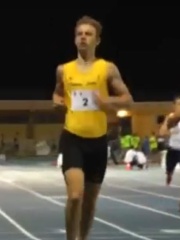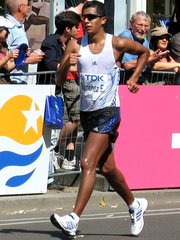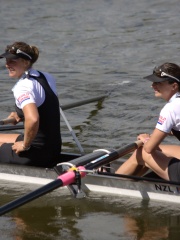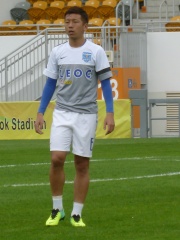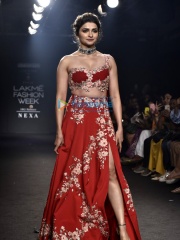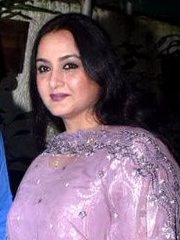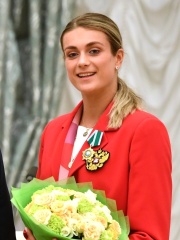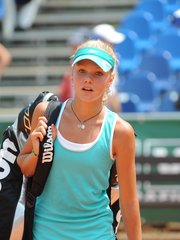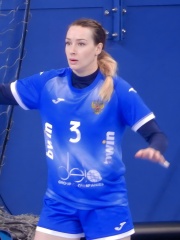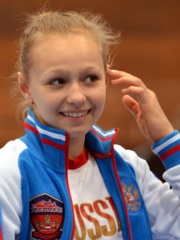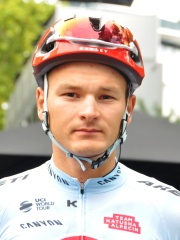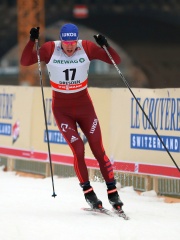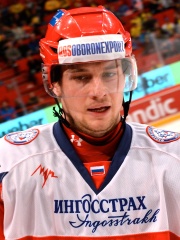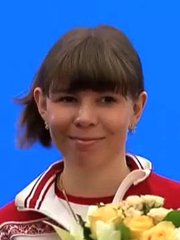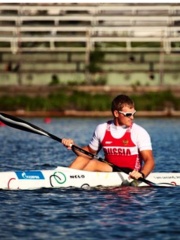Athlete
Irina Davydova
1988 - today

 Irina Davydova
Irina Davydova
Her biography is available in 14 different languages on Wikipedia. Irina Davydova is the 7,901st most popular athlete, the 4,099th most popular biography from Russia and the 473rd most popular Russian Athlete.
Irina Davydova is a Russian hurdler born in 1988, known for her performances in the 100 meters hurdles. She has competed in various international competitions, representing Russia in athletics.
Memorability Metrics
Page views of Irina Davydova by language
Among Athletes
Among athletes, Irina Davydova ranks 7,901 out of 6,025. Before her are Twanisha Terry, Carolin Nytra, Valentina Acosta Giraldo, Anaso Jobodwana, Rita Keszthelyi, and Aminat Yusuf Jamal. After her are Lorenzo Patta, Tatsunori Otsuka, Annamari Dancha, Cristian Toro, Eder Sánchez, and Rebecca Scown.
Most Popular Athletes in Wikipedia
Go to all RankingsTwanisha Terry
1999 - Present
HPI: 32.55
Rank: 7,895
Carolin Nytra
1985 - Present
HPI: 32.55
Rank: 7,896
Valentina Acosta Giraldo
2000 - Present
HPI: 32.55
Rank: 7,897
Anaso Jobodwana
1992 - Present
HPI: 32.55
Rank: 7,898
Rita Keszthelyi
1991 - Present
HPI: 32.55
Rank: 7,899
Aminat Yusuf Jamal
1997 - Present
HPI: 32.54
Rank: 7,900
Irina Davydova
1988 - Present
HPI: 32.53
Rank: 7,901
Lorenzo Patta
2000 - Present
HPI: 32.53
Rank: 7,902
Tatsunori Otsuka
2000 - Present
HPI: 32.52
Rank: 7,903
Annamari Dancha
1990 - Present
HPI: 32.52
Rank: 7,904
Cristian Toro
1992 - Present
HPI: 32.52
Rank: 7,905
Eder Sánchez
1986 - Present
HPI: 32.51
Rank: 7,906
Rebecca Scown
1983 - Present
HPI: 32.51
Rank: 7,907
Contemporaries
Among people born in 1988, Irina Davydova ranks 1,793. Before her are Naoya Okane, Mika Ojala, Takashi Uchino, Masaaki Ideguchi, Prachi Desai, and Abiola Dauda. After her are Tatsuya Arai, Heather Marks, Yuya Yamada, Bianca Pascu, Junki Kanayama, and Farah.
Others Born in 1988
Go to all RankingsNaoya Okane
SOCCER PLAYER
1988 - Present
HPI: 32.57
Rank: 1,787
Mika Ojala
SOCCER PLAYER
1988 - Present
HPI: 32.57
Rank: 1,788
Takashi Uchino
SOCCER PLAYER
1988 - Present
HPI: 32.55
Rank: 1,789
Masaaki Ideguchi
SOCCER PLAYER
1988 - Present
HPI: 32.55
Rank: 1,790
Prachi Desai
ACTOR
1988 - Present
HPI: 32.54
Rank: 1,791
Abiola Dauda
SOCCER PLAYER
1988 - Present
HPI: 32.53
Rank: 1,792
Irina Davydova
ATHLETE
1988 - Present
HPI: 32.53
Rank: 1,793
Tatsuya Arai
SOCCER PLAYER
1988 - Present
HPI: 32.50
Rank: 1,794
Heather Marks
MODEL
1988 - Present
HPI: 32.50
Rank: 1,795
Yuya Yamada
SOCCER PLAYER
1988 - Present
HPI: 32.50
Rank: 1,796
Bianca Pascu
FENCER
1988 - Present
HPI: 32.48
Rank: 1,797
Junki Kanayama
SOCCER PLAYER
1988 - Present
HPI: 32.47
Rank: 1,798
Farah
ACTOR
1988 - Present
HPI: 32.45
Rank: 1,799
In Russia
Among people born in Russia, Irina Davydova ranks 4,099 out of NaN. Before her are Maria Ugolkova (1989), Martin Malyutin (1999), Elena Nikitina (1992), Inessa Merkulova (1964), Polina Komar (1999), and Sofya Zhuk (1999). After her are Abubakr Abakarov (1999), Misha Zilberman (1989), Polina Gorshkova (1989), Daria Spiridonova (1998), Dmitry Strakhov (1995), and Alexander Panzhinskiy (1989).
Others born in Russia
Go to all RankingsMaria Ugolkova
SWIMMER
1989 - Present
HPI: 32.59
Rank: 4,093
Martin Malyutin
SWIMMER
1999 - Present
HPI: 32.58
Rank: 4,094
Elena Nikitina
ATHLETE
1992 - Present
HPI: 32.58
Rank: 4,095
Inessa Merkulova
ATHLETE
1964 - Present
HPI: 32.58
Rank: 4,096
Polina Komar
ATHLETE
1999 - Present
HPI: 32.56
Rank: 4,097
Sofya Zhuk
TENNIS PLAYER
1999 - Present
HPI: 32.56
Rank: 4,098
Irina Davydova
ATHLETE
1988 - Present
HPI: 32.53
Rank: 4,099
Abubakr Abakarov
WRESTLER
1999 - Present
HPI: 32.49
Rank: 4,100
Misha Zilberman
BADMINTON PLAYER
1989 - Present
HPI: 32.46
Rank: 4,101
Polina Gorshkova
HANDBALL PLAYER
1989 - Present
HPI: 32.45
Rank: 4,102
Daria Spiridonova
GYMNAST
1998 - Present
HPI: 32.43
Rank: 4,103
Dmitry Strakhov
CYCLIST
1995 - Present
HPI: 32.41
Rank: 4,104
Alexander Panzhinskiy
SKIER
1989 - Present
HPI: 32.35
Rank: 4,105
Among Athletes In Russia
Among athletes born in Russia, Irina Davydova ranks 473. Before her are Egor Yakovlev (1991), Sergey Trofimov (1995), Ekaterina Shumilova (1986), Elena Nikitina (1992), Inessa Merkulova (1964), and Polina Komar (1999). After her are Roman Anoshkin (1987), Eduard Popp (null), Yulia Karimova (1994), Yury Postrigay (1988), Mikhail Akimenko (1995), and Oleg Stoyanovskiy (1996).
Egor Yakovlev
1991 - Present
HPI: 32.72
Rank: 467
Sergey Trofimov
1995 - Present
HPI: 32.68
Rank: 468
Ekaterina Shumilova
1986 - Present
HPI: 32.60
Rank: 469
Elena Nikitina
1992 - Present
HPI: 32.58
Rank: 470
Inessa Merkulova
1964 - Present
HPI: 32.58
Rank: 471
Polina Komar
1999 - Present
HPI: 32.56
Rank: 472
Irina Davydova
1988 - Present
HPI: 32.53
Rank: 473
Roman Anoshkin
1987 - Present
HPI: 32.32
Rank: 474
Eduard Popp
HPI: 32.23
Rank: 475
Yulia Karimova
1994 - Present
HPI: 32.13
Rank: 476
Yury Postrigay
1988 - Present
HPI: 31.98
Rank: 477
Mikhail Akimenko
1995 - Present
HPI: 31.84
Rank: 478
Oleg Stoyanovskiy
1996 - Present
HPI: 31.83
Rank: 479
